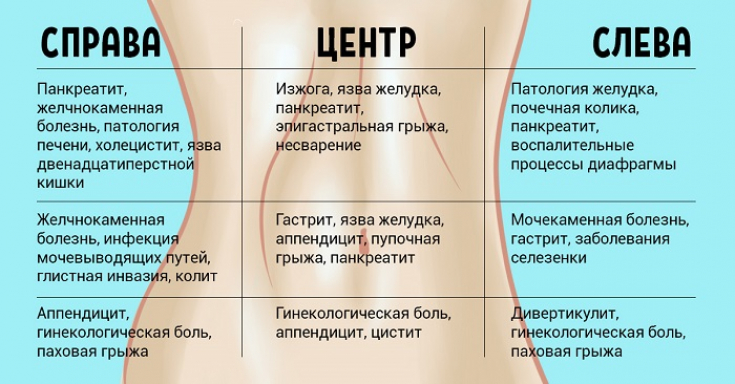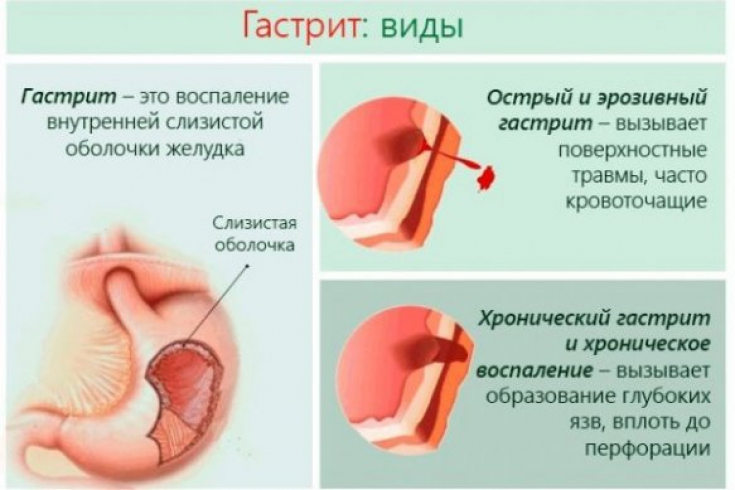Acute pain in the stomach is familiar, perhaps, to everyone. For some, this is a familiar companion of chronic gastritis, for others — an unpleasant consequence of overeating. But everyone who has personally become acquainted with this symptom wants to understand the cause of this condition and get rid of it as soon as possible.
In fact, there are a lot of factors that provoke pain in the stomach. But among them there are a few that are not associated with ulcers or other stomach diseases. And it is precisely such states that deserve special attention.
- Acute pain in stomach: how it can be caused
- Excessive stretching of the walls of the stomach
- Diseases of the 12-colon colon or gallbladder
- Diaphragm spasms
- Intestinal diseases
- What to do for acute stomach pain
Acute pain in stomach: how it can be caused
Pain in all cases plays the role of a signaling mechanism. It indicates an organ or part of the body that has been damaged by illness or injury and needs special attention. Acute pain in the stomach is not an exception — if it occurs not episodically, but constantly, then it is most likely about gastritis, peptic ulcer and other pathologies.
But the reasons for the "inexplicable" pain in the stomach, which arose suddenly against the background of full health, can be:
Excessive stretching of the walls of the stomach
Most often it — the result of severe overeating. Average stomach capacity — 1 l. But this includes both food and working volume. This means that for high-quality digestion of food in the stomach, there must be free space for moving and mixing food. When overeating, the working volume does not remain and, as a result, the stomach has to maximize the contractions of the walls in order to mix the food, as a result of which sharp spasmodic pains develop.
Read also: Gastroenteritis: symptoms and treatment of the disease
Diseases of the 12-colon colon or gallbladder
A characteristic feature of this pain is its occurrence after eating certain foods — spicy, fatty, sour. It stimulates increased activity in the duodenum and gallbladder, which are responsible for the enzymatic processing of proteins, fats and carbohydrates. Accordingly, if any of these organs is unhealthy, the need to throw a large amount of enzymes into the stomach to digest fatty or other foods causes pain.

Diaphragm spasms
The stomach is practically "lying" on diaphragm — membrane that separates the abdominal and thoracic cavities. And often, discomfort in the diaphragm is perceived as gastric symptoms. Sharp pain that lasts literally a few seconds and passes — — characteristic symptom of diaphragmatic spasm. It often develops during fast walking, prolonged lying on the side, with an uncomfortable, bent sitting position.

Intestinal diseases
Pain in stomach — a frequent companion of intestinal infections and other intestinal diseases. With them, the motor function is severely impaired and spasms develop, which can be directed upward by the reverse peristaltic wave, towards the stomach. intestinal gases, increasing the volume of the intestine, make it "support"; diaphragm and put pressure on stomach.
Read also: How to get rid of bloating: 5 tested ways
What to do in case of acute stomach painFirst and most important thing to know: Seek immediate doctor care if:
- You don't know what causes stomach pain.
- Pain does disappear within half an hour.
- The pain gets worse and/or spreads to the abdomen, chest, back.
- The muscles of the anterior abdominal wall are very tense ("stone belly").
- Pain is accompanied by other symptoms (nausea, vomiting, diarrhea, severe bloating, prolonged absence of stools and flatulence, increased body temperature).
- You have any chronic diseases of the digestive system.
- Did you take any medications before your stomach pain.

If the pain is caused by overeating — take an enzyme preparation that facilitates digestion. Such funds are dispensed in pharmacies without a prescription.
If the pain is caused by eating spicy or acidic foods — prepare a decoction of flaxseed, very thin and boiled rice or oatmeal and take these "jelly" instead of eating for 5-7 hours, for 3-5 tbsp. l. every hour. The mucous consistency of such dishes envelops the walls of the stomach and protects them from the effects of acids.
Therefore, if you have any doubts about the causes of pain or the recommendations listed did not help to alleviate — contact doctor immediately.
Read also: Diet for gastritis: what you can eat with different types of disease
You might be interested: Perfect belly in 5 minutes!






Add a comment